Bombay to Ahmedabad to London to... your hometown. Why telling the stories of our lives is vital and valuable
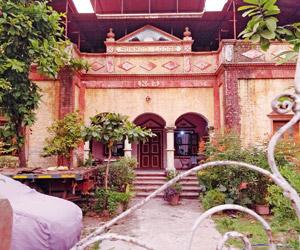
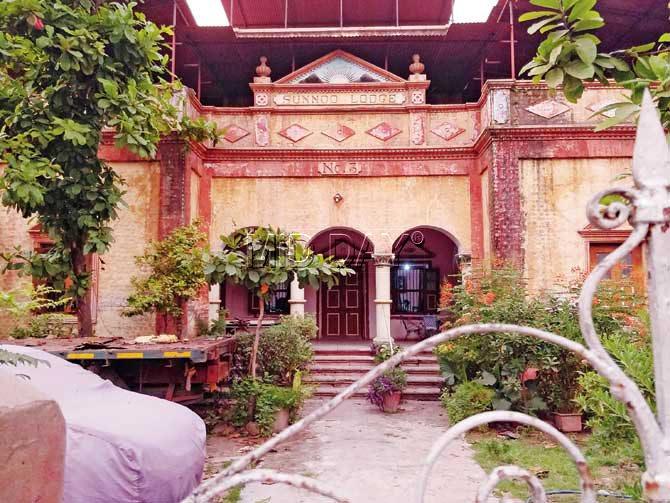
Sunnoo Lodge in Ahmedabad, standing since 1923, evokes warm memories for the columnist's family. Pic/Ayesha Marfatia
We landed. We looked. We laughed. At the relative ease (pun properly intended) with which we came upon what we searched for. It was my daughter's idea. To celebrate her 21st birthday last month in a way she alone could think of: heading to Ahmedabad to find her great-grandfather's 1923 home there.
Despite my husband's family furnishing random clues, our hunt was actually catalysed by this paragraph in Rashid Medora's book, Parsis of Ahmedabad: "Naushir M Marfatia started a company after his name and enjoyed a large share of accounting and auditing business in Ahmedabad. It is still in existence but no member of his family or the community is involved in the firm."
What we did want to be involved with was figuring where Naushir Marfatia grew up. Our excursion would bring back warm childhood memories for his octogenarian daughters in Bombay. Medora's wife, Meher guided us on the phone, charting a route to Sunnoo Lodge, named after Naushir's mother. When we finally stood staring at it, Bungalow No. 3 (of 17 such in the Parsi Colony at Kankaria), bathed in pink-gold shafts of setting sun on the very evening we arrived, the feeling was indescribable. Thirty years apart, we were suddenly charged with the same surge. Both tugged by a welling eddy of identical emotions — of legacy, of belonging, of continuity.
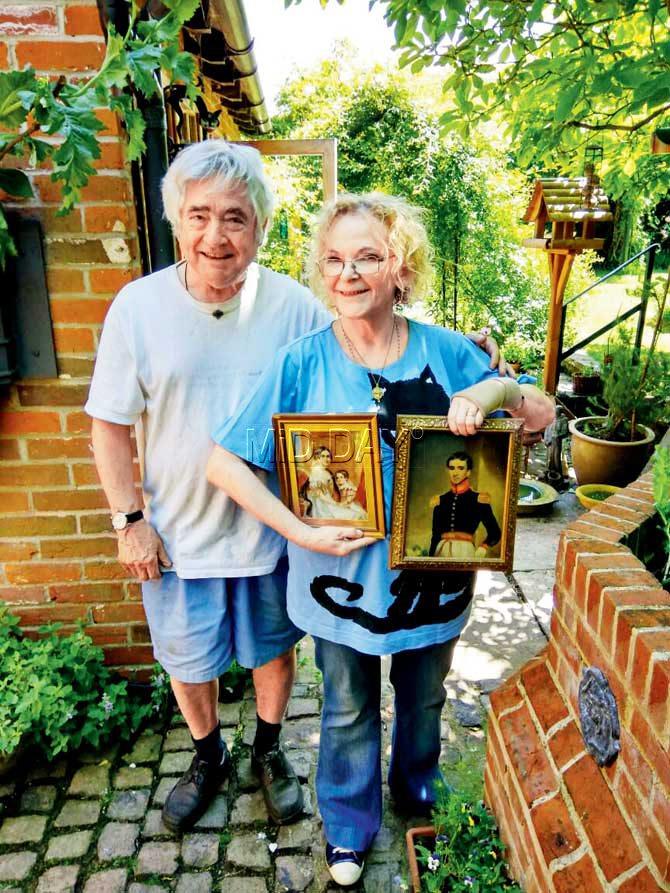
In the garden of their home at Lavenham village in Suffolk, Neil Warden and his wife Lindsay hold a portrait of their ancestor Captain Richard George Warden, "direct ascendant" of Francis Warden after whom the Bombay street is named. Pic/Prakash Nayak
We put up at an apt place, under the circumstances. Matching the mood of our rewind moment was Abhay Mangaldas' mansion, restored as the atmospheric House of Mangaldas hotel. His architect father Kamal advised Abhay to take on this property when the extended clan divided assets. "The central idea behind renovation was to keep the essence of a family home and hospitality constant," says Abhay. "Photographs in the lobby, from ancestors to the current generation, show an interesting evolution over three to four generations in appearance and attire."
Only connect, EM Forster pleaded in Howards End. "Only connect... and human love will be seen at its height. Live in fragments no longer." That was a 1910 novel in which the author feared technology could trounce tenderness — "Month by month the roads smelt more strongly of petrol, they were more difficult to cross, human beings heard each other speak with greater difficulty and saw less of the sky."
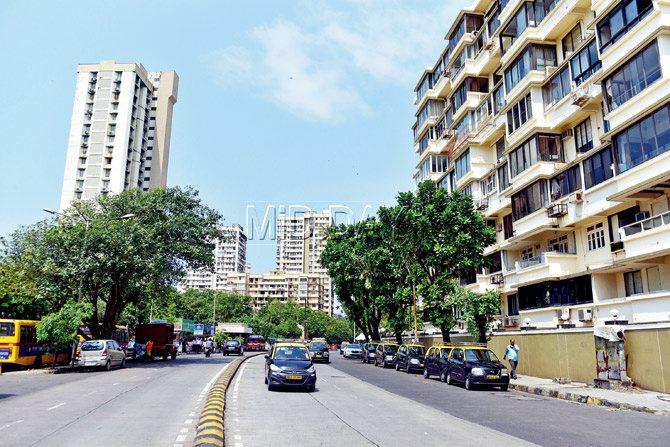
Francis Warden, for whom Warden Road was named, served as Chief Secretary of Bombay Presidency in the 19th century and then an East India Company director. Pic/Bipin Kokate
Forster's would be ultimate despair today. In an age when we click online for floods of inaccurate and often useless information, hitting the "Backspace" button of the brain instead might be refreshing. This entails tracing, tracking, trailing — something that makes you walk, talk and chalk out plans leading to delightful discoveries. It means trusting the universe, underestimating nothing, embracing surprises, surrendering to serendipity.
Khorshed and Prakash Nayak did. Taking a wrong turn along the remote paths of the little English wool town of Lavenham in Suffolk earlier this year, they got lost. Finding their way again, with the gift of a mutual knowledge they didn't dream of. Exploring that quaint Tudor survivor of a village — with timber-framed, two-colour tiled homes cottages oozing medieval heritage — the couple spied an elderly gentleman raking the leaves in his rambling garden. "He saw us studying a map. 'Where are you from?' he asked, excited when we said, India," says Khorshed. "'Which city?' 'Mumbai', we answered. 'A Mumbai road is named after my ancestor,' said Neil Warden. 'That's our street!' we burst out."
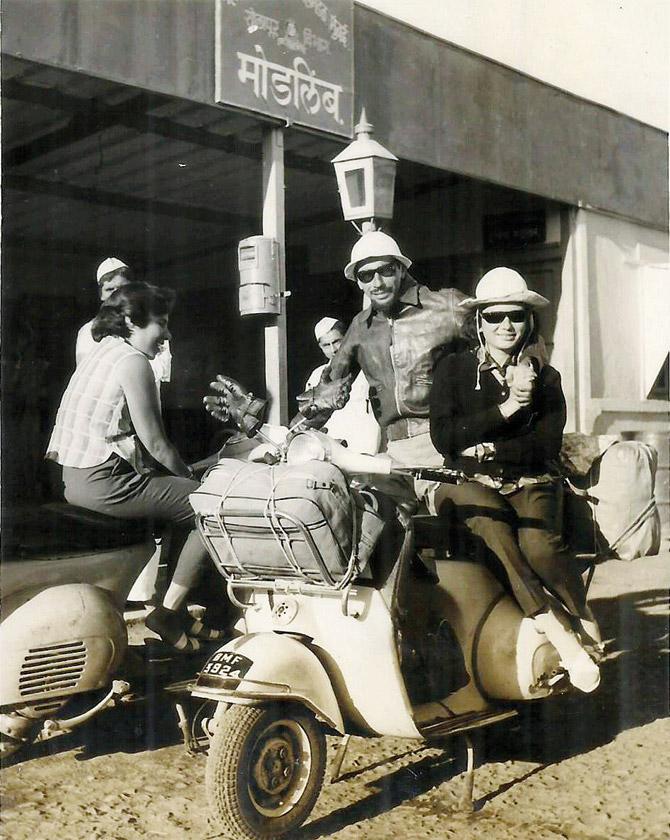
Rumi and Freny Taraporevala on their 1966 scooter journey through South India on a 150 CC Vespa. Pic courtesy Rumi Taraporevala
Grabbing them inside to introduce his wife Lindsay, Neil brought off the wall portraits of Captain Richard George Warden, "direct ascendant" of Francis Warden who christened the Breach Candy street that's home to the Nayaks and me. Chief Secretary of Bombay Presidency in the 19th century and then an East India Company director, Francis Warden has been the subject of research by Neil's sons, accountant Nicholas and actor Richard Warden, with help from the family history forum RootsChat. Nick and Rick — as they signed serial mails to me once Khorshed informed them I had mentioned Francis Warden in an earlier edition of this column — have followed their forefather's career from 1795. Nick intends exploring Warden Road here in the spring of 2018.
Rick writes: "We deduced that Francis Warden — a high ranking civil servant in Bombay and beyond — was a cousin of our great great great-grandfather Richard George Warden, dying on January 6, 1853. The riddle isn't made any easier by all of the generations above calling themselves George (or indeed Francis or Richard). I visited a Putney cemetery on Nick's recommendation. To my amazement I found this grave, aged because it's been walked on over a hundred and fifty years. If you look carefully, you can make out 'Francis Warden' and his death date suggested above."
Elsewhere it emerges that Francis was "a fearless senior administrator who took on the high and mighty on behalf of Indians", including educational debates with Elphinstone, the Governor of Bombay.
"What were the odds? It was something fantastic, the power of coincidence," marvels Prakash of the chance encounter. "Thirty seconds more and we'd never have met. Neil was about to disappear inside. He had finished sweeping to spruce his house for a tourists' viewing the next day." Khorshed adds, "Good thing we were as curious as Neil."
Healthily limited curiosity is a must with the privilege of gathering oral history. Natter minus nosiness, dodge the fall into inquisitiveness. It's about engaging people enough to open up and let you in on their past without prying. A slippery slope for sure. This is why we applaud a contained initiative like Anusha Yadav's self-motivated Indian Memory Project. Threading together glimpses of the public face of private lives, she invites family stories with sepia snapshots from across the country.
The results are richly riveting. Driven by personal discretion and partial sharing, each engrossing account is pure treasure. Of immense value and impact, these range from "My family were pioneers of photography in the subcontinent", to "Founder of the first Waldorf kindergarten in Karnataka", to one of my favourites — "My family made the pen that wrote the Constitution of India". (Incidentally, Dr Ambedkar drafted tracts of that seminal work diligently bent over Table No. 4 of Wayside Inn, Kala Ghoda.)
A recent recounting I consider quite special is 87-year-old Rumi Taraporevala's desi version of the Motorcycle Diaries. The travels and travails of the spirited biker and his wife Freny, with cousins, on their motorcycle journey through South India in February 1966, is a compelling read. Sputtering the miles from Cochin to Bombay (via Kodaikanal, Coimbatore, Ooty, Mysore, Bangalore) astride a 150 cc Vespa, Taraporevala amusingly recalls two-wheelers of the time: "When you kick-started your vehicles, those babies turned temperamental and gave you a solid kick right back, which was bloody painful... In the cheapest of hotels, cleanliness was the order of the day. The roads were good, truckers well mannered and amiable, and with a toot from our squeaky horns allowed us to pass with a wave of the hand. We clocked about 2,700 km from Coimbatore to Bombay and did not spend more than Rs 1,000 each on the entire trip." How civility, affability and affordability fuelled smoother road trips half a century ago.
Why do I wander into different corners of our city every other week? "It's not so much what you learn about Mumbai, it's what you learn about yourself," said Danny Boyle, spot-on. Every person I meet fills me with more than simply remarkable facts. Rather than delicate sniffs of nostalgia, theirs are robust revelations which happily lead to my own. It's important: chronicling the past makes better sense of the present, holds hope for the future.
The trick is to be a believer. Believe in the beauty of bonds, in the logic of lineage, in probabilities, possibilities, the promise of "perhaps" — and you have an oral history. It can seem a lot like embarking on a quest of the unknown. Evoke without embellishing. Authenticating is tough but worth some slog. There's an unforgettable, waiting-to-be-told story for everything, from that fragile vase in the hall, to the crumpled tram ticket, to a shredding saree in an aunt's wardrobe.
Preserve the pieces. Save the scraps. Join the dots. Cast around. Our neighbourhoods thrive with an inspiring autumnal generation whose unique vintage experiences we can't even begin imagining. Their recollections are your rewards.
Locate. Listen. Lengthen. Roots before wings, the children after us deserve to know. Dig out that story. Tell it with passion. Tell it with pride. Just tell it.
Author-publisher Meher Marfatia writes fortnightly on everything that makes her love Mumbai and adore Bombay. You can reach her at mehermarfatia@gmail.com
 Subscribe today by clicking the link and stay updated with the latest news!" Click here!
Subscribe today by clicking the link and stay updated with the latest news!" Click here!









